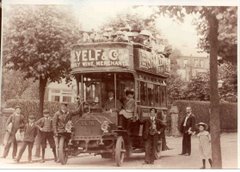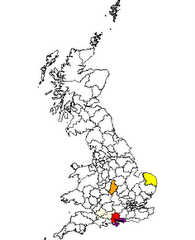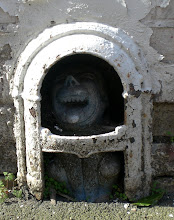Let’s be honest here, this is not the sort of article you would expect to see written on a site dedicated to anyone researching the Browns, Bakers or Bartholomew family. Any attempt to look at the range of any of these names in fiction would be futile because, … well, there are just too many! If this is the case with these common names then the opposite is true with Yelf though. A name given to a few hundred individuals in a small corner England would be extremely unlikely to crop up in a work of fiction and you’d think that the chances of anyone deliberately choosing it were nigh on zero and if by some strange coincidence they did use it, you’d have to wonder where they heard it originally. Still, I thought it was worth a look so off I went…
First up is “The Story of Dick” written by Ernest Gambier Perry. This seems (and I have to confess I haven’t read it) to be a typical uplifting Victorian story of an orphan or poor relative moving in with a new family. There’s tension action and adventure and at last the youngster is seen to have been a positive force for all those around him. But don’t take my word for it as I found a short extract from “The Review of Reviews” by by William Thomas Stead in 1936Without exactly intending to be unkind, Mrs. Yelf—a somewhat milder edition of Hannah Grieve – resented the coming of her brother-in-law’s ten year old soldier-like child to her home fearing that he would influence her own little son, whom she coddled and spoiled. In some respects the story reminds me of “Tim” but it is far happier and quite as pathetic. .Dick himself is a fine, honest, manly little chap and he soon strengthens the farmers girlish boy. The scene in which he reads the burial service over the soldier-suicide’s grave is very pretty. This is a story that will delight children and “grown-ups” alike.
Ernest Gambier Perry seems to have come from a wealthy and artistic family. His father, Thomas Gambier Perry was a notable art collector of Renaissance works whose collection now forms part of that belonging to the Courtauld Institute in London. In 1915 Ernest inherited much of his fathers collections in 1915, along with the Highnam Court Estate. Ernest also wrote articles, notably one on sport and sportsmen for the ‘New Review’ in1894 but I have not, as yet, found any evidence of other books. So where did he come up with the name of Yelf for the family? Well a look at the map shows that the Highnam Court Estate is just by Gloucester and about 45 minutes from another Gloucestershire town, Moreton-in-the-Marsh and in 1891 this was the home of one of the few Yelf families outside of Hampshire. (see the 1891 Yelf distribution map to the right). My guess would be that Ernest had either heard of or read of the Yelfs or possibly, as they were doctors and surgeons, met them in a professional capacity. He was looking for an interesting and unusual name for his protagonist family and Yelf fitted the bill nicely. OK, there’s no proof and this is wild speculation on my part, but it is a possibility. The only direct quote I could find for this book was
‘Mrs. Yelf prided herself upon the training of farm-servants’
which is always a useful skill to be able to fall back on!
I am again having to scratch around for on-line references, but the quotes I did find give a general indication of the Yelf’s progress through the novelsSeth Warren was indeed called second mate by which was merely meant that he took charge of the Captain’s watch whenever he saw fit to go below for Captain Rhines stood his own watch. In the larboard watch were Robert Yelf and Sam Edwards
“The sponge they obtained by diving ; and Yelf brought up one that had attached itself to a conch” The Ark of Elm Island
“Father knows all about vessels, and Mr. Yelf is a regular shipwright. ... Ben and Yelf made the same criticism as Uncle Isaac” Young Shipbuilders of Elm Island
“…Yelf could ride when altogether too drunk to walk” Lion Ben of Elm Island
“…old Mrs. Yelf, was staying with me (she was a Dinsmore before she
married Sam Yelf)” Boy Farmers of Elm Island“Yes ; tell us," said Charlie. “Well, I'll tell you, and see what you think of it.
Mr. Yelf is going to be put into the ground to-morrow, ...” Charlie Bell the Waif of Elm Island




No comments:
Post a Comment